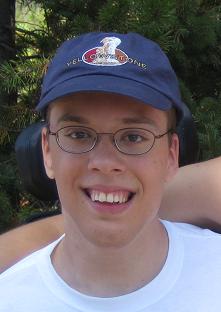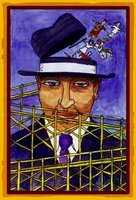Life Lessons
If you haven’t seen this video, take a look. It was made by Amanda, author of the blog Ballastexistenz. Here’s her description of her video, In My Language,
“The first part is in my 'native language', and then the second part provides a translation, or at least an explanation. This is not a look-at-the-autie gawking freakshow as much as it is a statement about what gets considered thought, intelligence, personhood, language, and communication, and what does not.”
The video is 8 minutes long – watch the whole thing.
Amanda’s video caught the attention of CNN, and last night she was interviewed by Dr. Sanjay Gupta. (UPDATE: Here's the link to Part 1 of the interview.) More of her story will be featured again this evening on Anderson Cooper 360. (And here's Part 2)
Here are a few of Dr. Gupta’s reflections after their interview,
“She taught me a lot over the day that I spent with her."
“To an outside observer, the behaviors would seem eccentric, even bizarre. Because Amanda was able to explain them, they all of a sudden made sense.”
“It really started me wondering about autism. Amanda is obviously a smart woman who is fully aware of her diagnosis of low-functioning autism, and quite frankly mocks it. She told me that because she doesn't communicate with conventional spoken word, she is written off, discarded … Nothing could be further from the truth. As I sat with her in her apartment, I couldn't help but wonder how many more people like Amanda are out there, hidden, but reachable, if we just tried harder.”
Thank you, Amanda, for sharing so generously of yourself.
I think there are many people living outside the media-covered wealthy, “beautiful” society whose life experiences are not heard, not appreciated, not valued. What I am learning and I find intriguing is that it is very liberating to not be caught up in trying to be defined by society. Because of my cerebral palsy, I am already perceived as “different”, so I am more easily able to see that there is no obligation to conform. I have the freedom to pursue my values without the burden of conformity. I think this is a common realization among the people that I have met with disabilities and among the bloggers I read. Look at the bloggers on my blogroll. You don’t find them lamenting their inability to be live some other life, wallowing in self-pity, living the popular movie-represented life of disability. Instead, one finds ordinary people living their lives, embracing their individuality. Stephen Kuusisto recognizes this truth in his life, “I suppose I'm lucky: I don't live with the tyranny of celebrity photographs in my interior life.”
Kay Olson at the Gimp Parade, quotes Susan Wendell, author of The Rejected Body: Feminist Philosophical Reflections on Disability,
“Not only do physically disabled people have experiences which are not available to the able-bodied, they are in a better position to transcend cultural mythologies about the body, because they cannot do things the able-bodied feel they must do in order to be happy, 'normal,' and sane....If disabled people were truly heard, an explosion of knowledge of the human body and psyche would take place.”
When we really understand this message, we can transform our society out of conformity and into one that respects and values each and every person.










1 comment:
David, "goldfish" left this comment over at my blog about this post:
David -
Incredible insight by someone your age. I'm not surprised after reading your blog. I've enjoyed your writing many times.
Post a Comment